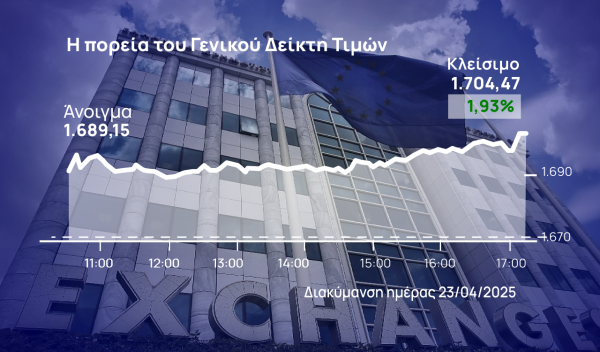
The government is honoring the anniversary of Labor Day with its work of the last four years. With a more important achievement, the reduction of the number of unemployed by 300,000, from 825,000 in June 2019 to 526,000 in February 2023 and the unemployment rate from the 17.5% we received, to 11.4%”, emphasized the Minister of Labor and of Social Affairs, Kostis Hatzidakis.
According to the Minister of Labor “it is no coincidence that in recent months, the difficulty of some companies to find workers and the subsequent improvement of wages in order to meet the needs of the market has been discussed more and moreoften in the public debate.
In addition to the reduction of unemployment, in the last 4 years:
– The minimum wage was increased three times, from 650 euros in 2019 to 663 euros in January 2022, 713 euros in May 2022 and 780 euros from April 2023. The cumulative increase is 20%.
– Insurance contributions were reduced by 4.4 percentage points.
– The application of the Digital Labor Card has begun in banks, supermarkets, insurance and security companies, it is about to be applied in utilities and after the elections it will be extended to industry, food service and tourism. The application of the Digital Card creates the conditions for a further reduction of insurance contributions as it increases the insurance material.
− New leaves were adopted to reconcile work and family life: extension of maternity leave and allowance in the private sector from 6 to 9 months, 14 days paternity leave, 4 months parental leave, carer’s leave, right to flexible arrangements for parents and caregivers etc.
− The Law on Labor Protection was passed, which provides, among other things:
● Right to disconnect from remote work.
● Health and safety obligations for digital platforms.
● Measures to prevent, limit and address the risks of violence and harassment at work.
● Trade union rights for delivery workers, establishing an obligation for digital platforms to cover the costs of protective equipment and the same welfare, health and safety obligations as workers with dependent labor contracts.
● Increase the severance pay for craftsmen to the level applicable to employees.
– The Labor Inspection Authority-SEPE was upgraded to an Independent Labor Inspection Authority and strengthened with modern equipment for direct, objective, and transparent inspections.
– New initiatives to support the unemployed were put in place, such as the work allowance for subsidized unemployed persons who find work and the €300 bonus for the long-term unemployed to draw up a digital individual action plan, which has already been paid to 65,000 unemployed people.
− The rate of recruitment through the Hellenic Manpower Employment Organization programs almost than quadrupled (+372%), from 762 per month in 2019 to 2,841 in 2023 and a total of 125,000 new jobs were created in 3.5 years
– Collaborations were initiated with international giants in the field of training (GOOGLE, AMAZON, MICROSOFT, CISCO, COURSERA). Training of 125,000 unemployed and employed people in digital and green skills has already started.
– The state’s housing policy was restarted with an emphasis on young and vulnerable citizens, with the implementation of programs that are already garnering great interest from the beneficiaries.
Of course, there is still much that can and should be done. The increase in wages is at the core of New Democracy’s program for the next 4 years: as Prime Minister Mr. Kyriakos Mitsotakis pointed out, one of the four goals in the economic sector in the next four years is to increase wages so that the average wage rises at 1,500 euros and the lowest at 950 euros. At the same time, the government’s aim will be to expand the application of the Digital Labor Card, which is a guarantee for the respect of working hours and overtime.
But the positive course is not a given and the progress achieved with the effort of the previous 4 years will be in danger of being lost if there is no seriousness and political stability. Which is a basic condition for investment, development and new jobs”.
Latest News

IMF: US Tariffs Shake Global Economy, Outlook Downbeat
IMF slashes global growth forecast to 2.8% as U.S. tariffs create uncertainty and ‘negative supply shock

First Step Towards New Audiovisual Industry Hub in Drama
The project is set to contribute to the further development of Greece’s film industry and establish Drama as an audiovisual hub in the region

Airbnb Greece – Initial CoS Ruling Deems Tax Circular Unlawful
The case reached the Council of State following annulment applications filed by the Panhellenic Federation of Property Owners (POMIDA)

Mitsotakis Unveils €1 Billion Plan for Housing, Pensioners, Public investments
Greek Prime Minister Kyriakos Mitsotakis has announced a new set of economic support measures, worth 1 billion euros, aiming to provide financial relief to citizens.

Alter Ego Ventures Invests in Pioneering Gaming Company ‘Couch Heroes’
Alter Ego Ventures' participation in the share capital of Couch Heroes marks yet another investment by the Alter Ego Media Group in innovative companies with a focus on technology.

Corruption Still Plagues Greece’s Driving Tests
While traffic accidents continue to claim lives on Greek roads daily, irregularities and under-the-table dealings in the training and testing of new drivers remain disturbingly widespread

Pope Francis Died of Stroke and Heart Failure Vatican Confirms
As news of the official cause of death spread, tributes poured in from across the globe. The 1.4 billion-member Catholic Church is united in grief, remembering a pope who championed inclusion, justice, and compassion

Increase in Both Museum Visits, Revenues for 2024
As expected, the Acropolis was the top archeological site in the country, followed by Sounion, Mycenae, the ancient theater of Epidaurus, and Vergina in northern Greece

Where Greece’s Tourists Come From: A Look at 2025’s Top Visitor Markets
The United Kingdom continues to hold the top spot as the largest source of incoming tourism, with 5.6 million seats booked for Greece this summer — up 2.2% from last year. This accounts for 20% of all international air traffic to Greece

Pope Francis: A Pontiff Who Reshaped the Papacy and Sparked a Global Conversation
His first words from the balcony of St. Peter’s Basilica—“Brothers and sisters, good evening”—set the tone for a pontificate that would challenge norms, favor mercy over dogma, and bring the papacy closer to the people.












![Πλημμύρες: Σημειώθηκαν σε επίπεδα ρεκόρ στην Ευρώπη το 2024 [γράφημα]](https://www.ot.gr/wp-content/uploads/2025/04/FLOOD_HUNGRY-90x90.jpg)



![Ξενοδοχεία: Μεγάλο το ενδιαφέρον για επενδύσεις στην Ελλάδα – Η θέση της Αθήνας [γραφήματα]](https://www.ot.gr/wp-content/uploads/2025/03/Athens-hotels-90x90.jpg)








![ΔΝΤ: Καμπανάκι για δημόσιο χρέος από δασμούς και αμυντικές δαπάνες [γράφημα]](https://www.ot.gr/wp-content/uploads/2024/05/30859482_Sharone-perlstein-microfinanace-debt-800x500_c-600x375-1-1.jpg)















 Αριθμός Πιστοποίησης
Αριθμός Πιστοποίησης